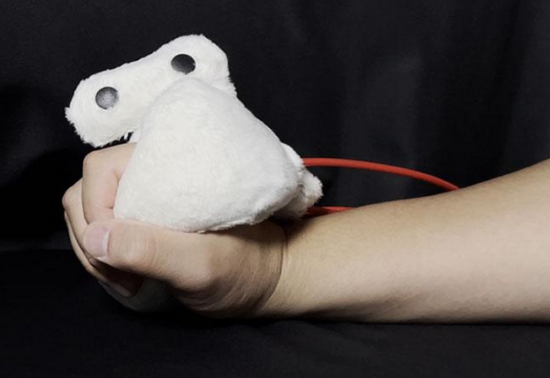Vaccines post-pandemic, the fuzzy comfort robot, pancreatic cancer breakthroughs, and more
22 Oct 2022
Posted by Andrew Kantor
A comfort robot
When a kid is afraid of a shot, holding a stuffed animal might help. But if you’re a Japanese engineer, you know what you need to do. You need to make a stuffed robot instead. Of course, that’s just what they did: created a wearable soft robot for adults or kids to use when getting a vaccination.
The soft, fur-covered robot the scientists called Reliebo was designed to be attached to the participant’s hand; it contained small airbags that could inflate in response to hand movements. […] holding the robot helped relieve the experience for patients regardless of the experimental conditions used.

Pancreatic cancer breakthroughs
Apply directly to the tumor
Pancreatic cancer is nasty, hard to spot, and hard to treat — drugs don’t usually work well, and the heavy doses of radiation required have obvious downsides.
Now Duke engineers think they have an alternative. It’s a way to bring the radiation inside the tumor, where lower doses can do the work. It’s a new material made of synthetic amino acids that’s mixed with iodine-231. The trick: It’s a liquid when injected, but turns into a gel inside the tumor, emitting radiation until it dissolves harmlessly.
The radiation makes the tumor susceptible to drugs like paclitaxel, which is injected once the little gel-bomb has done its work. And it works:
Overall, the tests saw a 100 percent response rate across all models, with the tumors being completely eliminated in three-quarters of the models about 80% of the time. The tests also revealed no immediately obvious side effects beyond what is caused by chemotherapy alone.
Stopping it before it starts
Before pancreatic cancer starts, there’s often inflammation that triggers a response called acinar ductal metaplasia. It’s supposed to help the pancreas turn acinar cells into protective ductal cells. But that process can also create mutated cells that lead to cancer.
University of Florida researchers have found a way to keep those acinar cells from changing in the first place — like keeping your teenage daughter from even visiting that creep Chad who works at the gas station.
So far this is just in mice, and there are obvious questions (“But what about those protective cells?”), so say it with me: More research is needed.
Atlanta-ish-area pharmacists: Your time is coming
If you’re in the Atlanta area — DeKalb, Forsyth, North Fulton, Gwinnett, Newton, or Rockdale county — your GPhA region meeting is this coming Thursday! If you haven’t registered yet, there’s still time!
It’s at McKendrick’s Steak House (4505 Ashford Dunwoody Road, Atlanta, business casual dress required) on October 27 at 6:30pm. If you miss it, you will forever live with the regret!
Click here to register today. [link]
Got questions? Reach out to Region 5 president Shirin Zadeh at shirin291@gmail.com or call her at (770) 403-4133.
After the pandemic
Vaccines get expensive
Pfizer will quadruple the price for its Covid vaccines to $110–$130 per shot. Insurers (including Medicare/Medicaid) will probably keep co-pays low; the latter can recoup the cost in premium hikes.
Vaccines get free (maybe)
… for kids, at least, if the CDC adds it to the Vaccines for Children Program, which means they’d be available free to parents like other childhood vaccines. A committee recommended the addition, but CDC hasn’t made a decision.
Millions lose health insurance
If and when the public health emergency ends, almost one in 10 people on Medicaid — 8.2 million people — will lose their coverage because they’re no longer eligible and will have to turn to private insurance, according to HHS data. (And an additional 6.8 million will lose coverage despite being eligible because of “bureaucratic obstacles.”)
The dozen remaining ‘non-expansion’ states, including Georgia, will see the biggest hit. The emergency, first declared by the Trump administration in January 2020, prohibited states from removing people from Medicaid.
CDC recommendations
This Thanksgiving, the CDC says “It’s safest to cook stuffing in a casserole dish instead of inside your turkey.” Please note that this is a recommendation, not a law. The CDC doesn’t have the power to have you arrested for cooking your stuffing the way you want.


